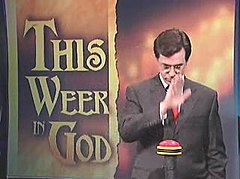My grandmother liked to say "my Father's house has many rooms." John 14:2
Yes, I know, some people say "mansions" and argue that John meant different physical churches, not different faiths. But that's not what my Grandmother meant.
Religion isn't really like politics in some fundamental ways, but in the same way that I like to think about and talk about politics - even with (and maybe especially with) people who disagree with me, I am interested in thinking about and talking about religion.
It's more difficult to talk about religion, I have found. In the same way that our political spectrum seems to be fast losing middle-ground, our religious spectrum seems to be doing the same thing.
I find myself often caught between people who are more religious in whatever direction than I am, who think I'm going to hell for not agreeing with them...

...and people who are atheists and think I'm stupid for not agreeing with them.
It kind of puts the kibosh on fun, two-sided conversation.
I'm actually less interested in what my own faith says about me than in what the many kinds of faith we humans have say about us, generally, and about why people believe or do not believe in higher powers. In my observations, faith or lack thereof has a lot to do with people's personal experience - which is both interesting and contrary to the idea of religion or atheism.
And because I am a Girl, I also find the history of religions and women fascinating.

In the media, these ideas tend to get blotted out by talk about a War Between Christianity and Atheism (if there's a war there, it's mostly a war of contempt), or between Judeo-Christianity and Islam in America. Maybe I'm betraying my liberal Protestant roots, but I think that's pretty insecure and/or self-centered.
Why does separation of Church and State make people so upset? I'm assuming it's based on a theory that if government is secular, that's some kind of leg-up for either atheism or non-Christian religions. But there are so many branches of Christianity that disagree - heartily - with each other on so many fundamental issues, that to argue that America is a majority-Christian nation begs the next question: which type of Christianity? Because I assure you many Christian organizations think my denomination is downright bad for being okay with gay marriage. And atheism and non-Christian religions are only a threat if you are so insecure about your own belief system that you think you need the edge that government-affiliation (read: establishment) would give you. That's a lot more understandable in Israel than it is in America, France, or Muslim countries, but all attempts to connect religion to government are born of fundamental insecurity.
Another weird concept? That science is adverse to religion. In a different form of the "Coexist" sign I put above, there is an "e=mc2" for "science" - as if science, like a religion, were simply a set of beliefs. You can be BOTH a believer in a religion AND a scientist. And if you don't "believe" in science, well, have you used gravity today? Do you eat broccoli and cauliflower? Is your cheese pasteurized? Do you take your kids to a doctor when they get sick? Do you like TV and cars? Why do you wash your hands? We all use science and the fruits of science constantly. It's downright silly to say you don't believe in it.
I want to share this great TMBG song with you, but even here we see a dismissal of religious thought as about unicorns. That kind of dismissal only feeds the anti-science beast, atheist friends.
The "battle" continues?



"That kind of dismissal only feeds the anti-science beast, atheist friends."
ReplyDeleteI must admit I lost a teeny tiny bit of respect when I read a couple of comments Neil DeGrasse Tyson made about Christians. I'm damn tired of being lumped in with fundamentalists and young-Earthers.
I always liked how one Catholic writer explained the idea of who goes to Heaven -- the rules God has given us (in the RCC) apply to us (all humans) and we must follow them, but God Himself is not bound by them. If he wants to let into Heaven a bunch of atheists, Hindus, Jews, pagans, etc., who are we to tell him "no"?
It's an odd kind of prejudice, not one I spend much time thinking about, but on the left there is definitely a dominant atheist or agnostic ethos. It honestly makes me way less likely to talk about religion. It's easy to agree with mocking ridiculous notions like the War on Christmas, but the underlying tone is often that the understanding is that only fools would believe in a religion.
ReplyDeleteAnd I find the back and forth NDGT has done interesting. He claims to be agnostic, which makes sense. But his statements often seem to mock anybody who would have the temerity to believe - and that runs counter to his stated mission to bring more people on board the science train. It's also arrogant in its own way, because who is anybody to say definitively one way or another?
It can be taken to a ludicrous extreme, too. Last summer, when the polygenic view of human evolution got some new evidence in its favor, and lots of atheists proclaimed this the death knell for Christianity, some Catholic apologists pointed out that the polygenic theory does not contradict the Church's teachings on humanity, Adam and Eve, and Original Sin. The prominent atheist/scientist Coyne ended up arguing vehemently that 1) Catholics were wrong in not interpreting Genesis strictly literally, and 2) we need to stop lying and admit we think the world was created 6,000 years ago. Then, of course, we need to admit that God doesn't exist at all.
ReplyDelete